From a ring of fire to a ring of peace
Israel faces a historic opportunity to secure its long-term security and prosperity. The establishment of a regional alliance with moderate Arab states could gradually end the Israeli-Arab conflict, weaken the Iranian axis, and bring an end to the jihadist fantasy of destroying Israel. In the long term, it could also lead to a resolution of the Palestinian conflict.
Dr. Ronit Levine-Schnur and Prof. Daphna Joel
Israel Hayom
Oct 11, 2024
This article was written following the impressive military successes of the IDF against Hezbollah, though it is not yet clear how other regional actors will respond or what steps the Israeli government will take. While these developments may have immediate implications for all of us, they do not change the broader picture. A war is unfolding in the Middle East, one that did not start on October 7 and is not just between Israel and Hamas or Hezbollah. The campaigns in Gaza and Lebanon are part of a much wider conflict that encompasses the entire region and, indeed, the world. It is a struggle for regional and global dominance, influence, and the future direction of humanity.
In the Middle East, the conflict pits the jihadist axis led by the Iranian regime—seeking to impose Iranian hegemony on the region—against the moderate Sunni regimes. On the global stage, the struggle for dominance and influence plays out in various arenas, including the war between Russia and Ukraine and the trade war between China and the US.
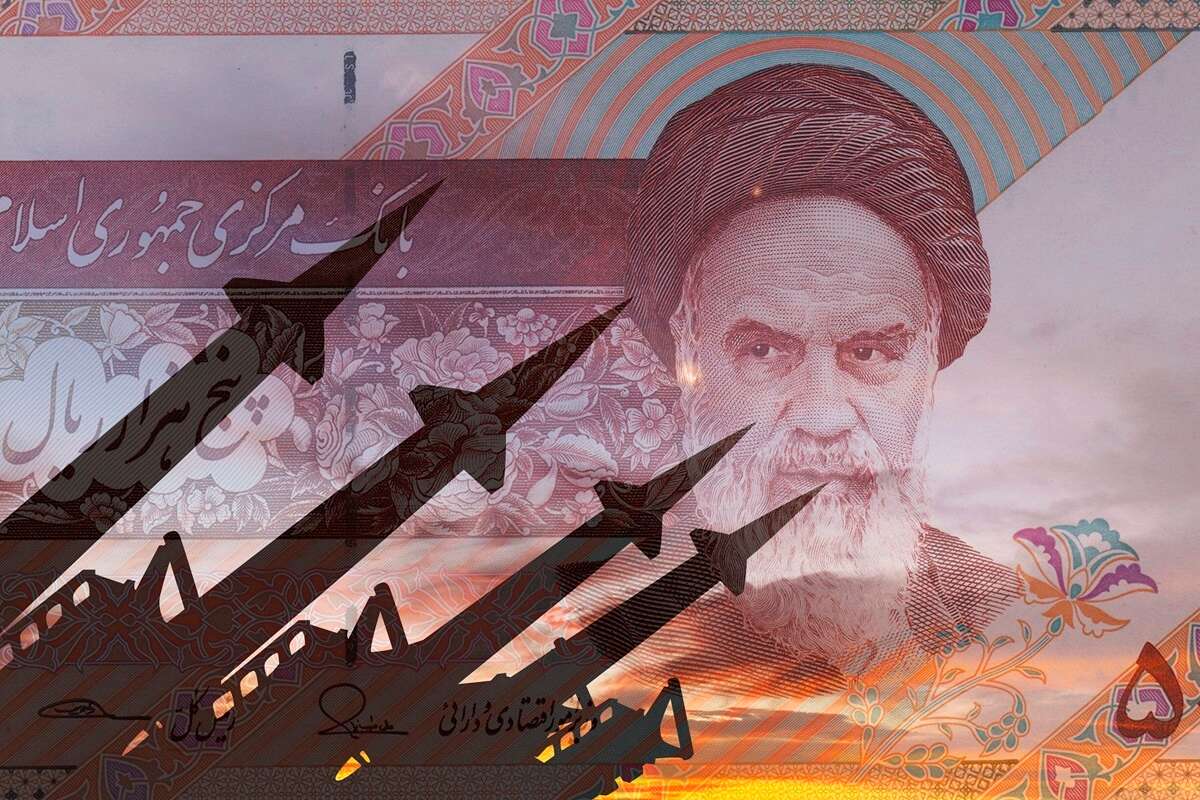
Iranian missiles on the background of a banknote of Iranian rials
China, Russia, and Iran each pursue global or regional hegemony, and
while they have conflicting interests, they share at least one:
undermining the status of the US and the centrality of liberal
democratic ideology. The current conflict in the Middle East is thus
part of a global struggle over resources, power, and control.
The fight between the jihadist and moderate axes is too significant to leave to experts alone. Every Israeli must understand what is at stake and form an opinion. This crucial period confronts Israel with unprecedented dangers but also offers a historic opportunity that it must not miss.
The depth of the threat posed by the jihadist axis to Israel, the horrors of the October 7 massacre, and the ongoing war in the south and north do not define the entire situation. Alongside these challenges, Israel has the chance to effect a historic change in the Middle East that could secure its safety across all its regions for generations to come. The solution, in four words, is: the establishment of a regional security alliance. Such an alliance would end the jihadist fantasy of destroying Israel, and in doing so, would mark Israel's true victory over Hamas, Hezbollah, and Iran.
The dream of a Muslim empire
The Iranian regime supports militias and terrorist organizations with extreme Islamist ideologies. The Iranian-jihadist axis includes Hezbollah in Lebanon, Hamas and Islamic Jihad in Gaza and the West Bank, the Houthis in Yemen, and pro-Iranian militias in Iraq and Syria.
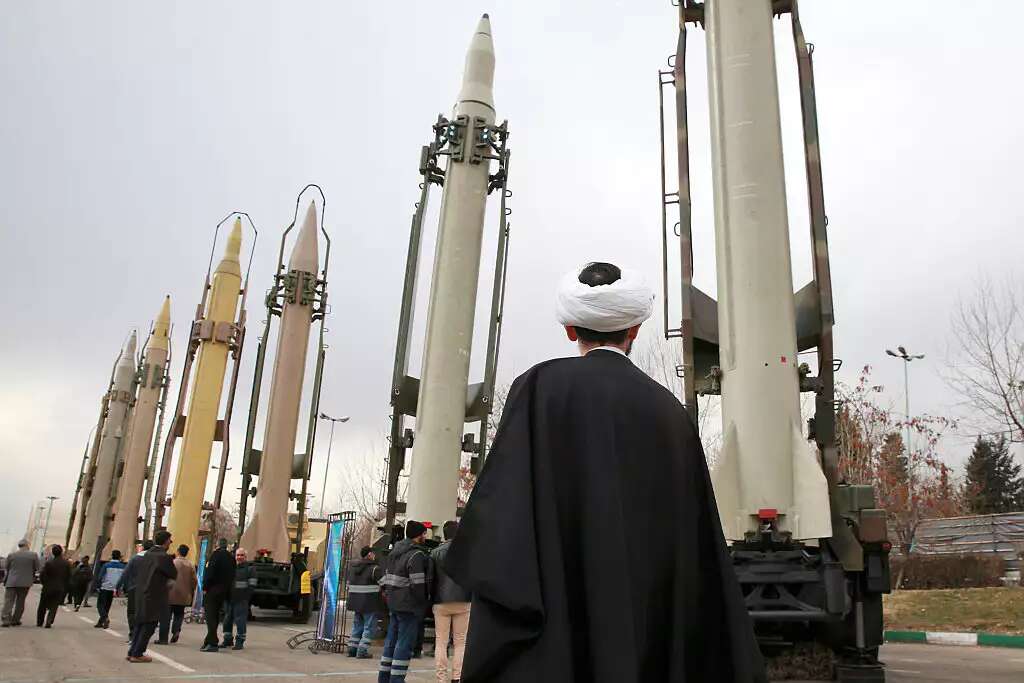
Ballistic missiles displayed to the public in Iran.
The Iranian regime is not the only one dreaming of a global Muslim empire. Iran envisions a Shia empire, while the Muslim Brotherhood, originating in Egypt, dreams of a Sunni Muslim empire, and al-Qaeda seeks to impose its extreme version of Sunni Islam worldwide. Sunnis and Shias have fought each other for centuries. Until recently, for example, Iran fought the Sunni terrorist group ISIS (Islamic State). However, there are also collaborations between Iran's Shia regime and Sunni-jihadist groups. Hamas is a central example, though not the only one. These groups share at least one goal: the destruction of Israel ("the Little Satan") and the US. ("the Great Satan"). As mentioned, in opposition to the US, the Iranian-jihadist axis finds common ground with Russia and China.
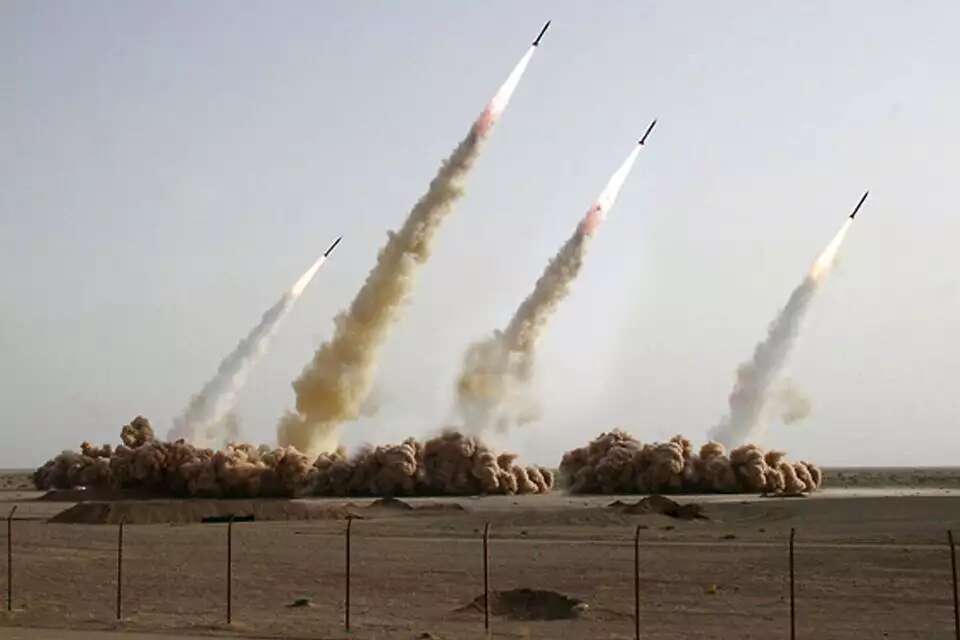
Missile firing test in Iran (archive).
The Iranian regime and jihadist groups threaten the stability of moderate Sunni states in the Middle East: Saudi Arabia, the UAE, Egypt, Jordan, Morocco, Bahrain, Oman, and others. These regimes aim to deepen their diplomatic and trade ties with the West and turn the Middle East into a stable and prosperous region. However, they must tread carefully in dealing with both Iran and jihadist influences within their own populations. Many other Muslim countries in Asia and Africa are sitting on the fence, waiting to see which side they should join.
Dominance in the Middle East
Those who have experienced the Israeli-Arab conflict firsthand, or who lived through the era when all Arab states sought to destroy Israel after its establishment, may find it hard to believe that a significant shift has occurred in Middle Eastern politics since 1948. Yet we are all aware of the longstanding peace treaties with Egypt (1979) and Jordan (1994), as well as the more recent Abraham Accords with the UAE and Bahrain (2020), which were soon joined by Morocco and Sudan.
Most people have also heard of the normalization initiative with Saudi Arabia, which Hamas tried to derail with its October 7 attack. However, it may be less well known that as early as 1981, then-Crown Prince Fahd of Saudi Arabia proposed the kingdom's first peace initiative.
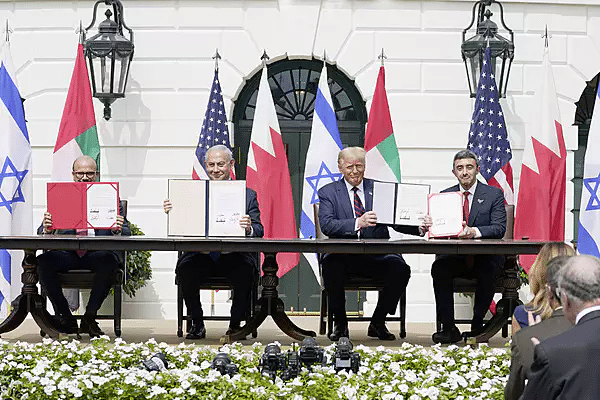
A Vital Asset. The signing of the Abraham Accords
In that initiative, Saudi Arabia affirmed that all Middle Eastern states, including Israel, had the right to exist in peace. Until that point, no Arab state, other than Egypt, had recognized Israel's right to exist. The Saudis sought to signal to the Americans their shared interest: opposing Soviet influence in the region by forming an anti-Soviet coalition of Arab states and Israel.
Twenty years passed without progress, until in 2002, Saudi Arabia, under Crown Prince Abdullah, relaunched its initiative. This version explicitly stated that the Arab states would normalize relations with Israel in the context of a comprehensive peace, guaranteeing peace and security for all countries in the region. The Arab League, comprising all Arab states, fully adopted the initiative.
The moderate Arab states have a clear interest: they want to create a coalition against the forces threatening their regimes—formerly the USSR, and now Iran—and to strengthen ties with Western countries that can help them against Iran's expansionist ambitions and ensure their economic prosperity. For example, although oil-rich states are often seen as immensely wealthy, Saudi Arabia is thinking ahead. One of its main goals in recent years has been to ensure economic prosperity even after the oil era ends.
The interests of the moderate axis align with those of the US., which is equally clear: maintaining dominance in the Middle East. However, it is important to note that until recently, the US. was more preoccupied with other arenas and had reduced its involvement in the Middle East.
At a crossroads
Between the jihadist axis and the moderate axis, it is clear that Israel's interest lies in aligning with and strengthening the moderate axis by forming a regional security alliance.
Peace and normalization agreements with regional states would signify the end of the Israeli-Arab conflict. The creation of a regional security alliance between Israel and moderate Arab states would make Israel an unchallengeable, permanent reality—this would be the victory over the jihadist dream of destroying Israel. Moreover, a regional security alliance is crucial for Israel to defeat the Iranian-jihadist axis. It is a vital strategic asset, no less important than a strong air force and armored divisions. An alliance now would be a victory for generations.
However, we are not there yet. A key piece of this puzzle is Saudi Arabia, the wealthiest and one of the largest and most powerful states in the region. Under its de facto leader, Crown Prince Mohammed bin Salman, Saudi Arabia is undergoing a historic rapprochement with the West, fostering deep economic, diplomatic, and strategic ties with the US and Europe.
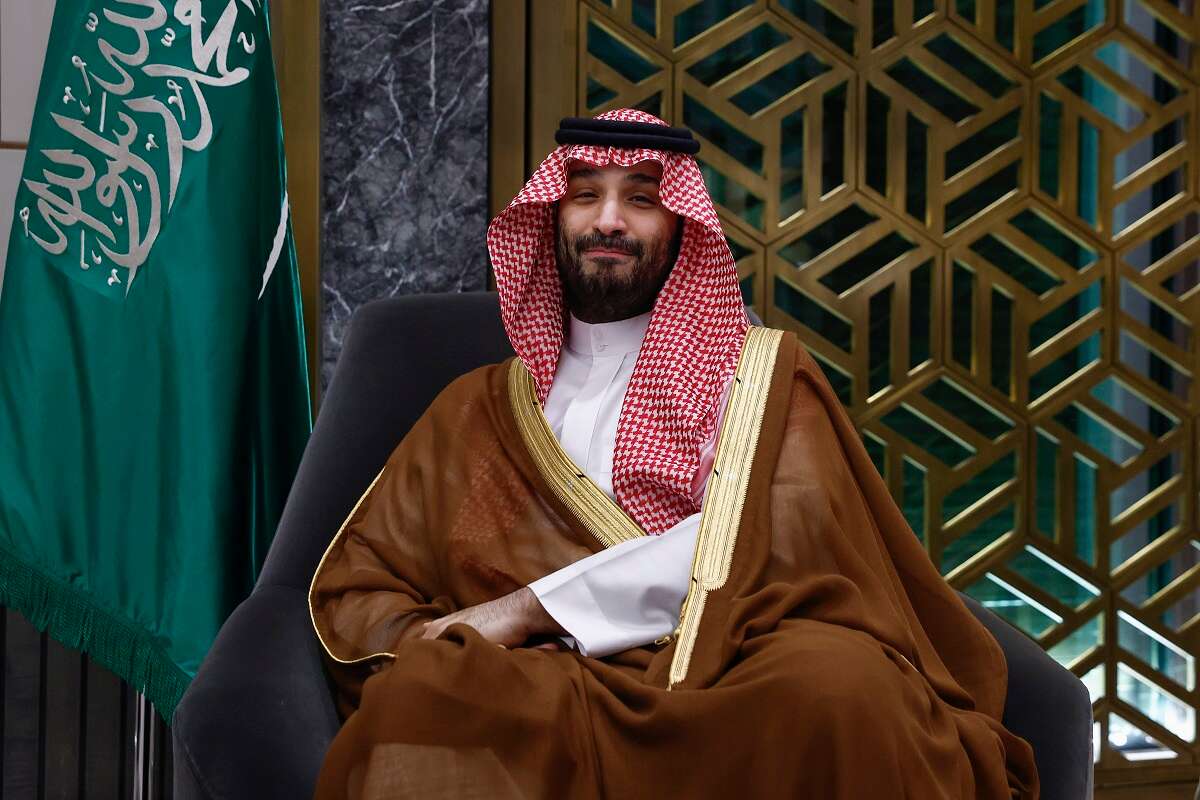
Crown Prince Mohammed bin Salman
On October 7, Israel and Saudi Arabia were on the verge of signing a historic normalization agreement. Two weeks earlier, Prime Minister Benjamin Netanyahu traveled to the US in part to advance the deal. The US led the negotiations between the parties as part of President Joe Biden's broader plan to create a "corridor" linking India, the Middle East, and Europe economically, transport-wise, and diplomatically. The missing link in this corridor is a small country in the Middle East—a tiny dot between Saudi Arabia and the Mediterranean—through which goods are supposed to flow back and forth between the Persian Gulf and the Mediterranean.
That country is, of course, Israel. This is one of the reasons why the normalization agreement between Israel and Saudi Arabia was so important to the US and moderate Arab states. As we know, the normalization agreement was not signed. Hamas's October 7 attack upended the cards.
The guiding hand
This was no coincidence. The timing of Hamas's attack clearly served both Hamas's desire to prevent Israel's regional and international legitimacy and the interests of the entire Iranian-jihadist axis in preventing rapprochement among members of the moderate axis. Indeed, it became evident the day after the horrific massacre that the war was not only being fought in Gaza and not only between Israel and Hamas. Hezbollah—like Hamas, an Iranian proxy on our borders—joined the fight. Soon after, the Houthis in Yemen began firing at Israel and even attacked ships in the Red Sea. On all fronts, Iran's fingerprints were clear: directing, financing, and arming. The missile arsenal with which Hezbollah threatens almost all of Israel, the majority of Houthi missiles, and some of the weapons Hamas used to carry out the horrific massacre—all came from Iran.
Iran's strategy is to wear down Israel through wars with its proxies in the region. Additionally, images of destruction from Gaza are being used to incite public opinion in moderate states against Israel, and the resulting public anger threatens the stability of these regimes and complicates their efforts to maintain ties with Israel. Thus, the continuation of a multi-front war weakens not only Israel but the entire moderate axis. This is Iran's clear interest.
Under these circumstances, what would serve Israel's interests? How can Israel protect itself from the Iranian threat—the ring of fire that Iran has built around us through its jihadist proxies, and the Iranian nuclear threat, which is closer than ever?
On the one hand, successful military actions can weaken the immediate threat. After nearly a year of war in Gaza, Hamas's military capabilities have been severely damaged, and a series of successful IDF operations in Lebanon in recent weeks led to the elimination of Hassan Nasrallah and most of Hezbollah's senior leadership, the deaths of thousands of its fighters, and significant damage to the organization's military capabilities, causing chaos in its ranks. But what will ensure Israel's long-term security? How can Israel leverage these impressive military achievements for strategic change?
The answer is clear once again: Israel must use the convergence of its interests with those of the region's moderate states and Western countries. All of them are harmed by Iran and its militias. The Iranian nuclear threat also endangers Middle Eastern states, and Iran's ring of fire chokes them as well. For example, Egypt has been greatly harmed by Houthi attacks on commercial ships passing through the Red Sea on their way to and from the Suez Canal, and the Houthis also threaten Saudi Arabia's development plans along the Red Sea coast. Moreover, the Iranian-jihadist axis harms the global economy and destabilizes the region, and tensions in the area could spiral into a world war. Many countries in the Middle East and the West would gladly cooperate in the fight against the Iranian regime and the jihadist axis.
We all witnessed the early signs of such cooperation on the night between April 13 and 14. For the first time, Iran directly attacked Israel with more than 300 ballistic missiles, cruise missiles, and unmanned aerial vehicles. The Iranian attack failed: about 99% of the launches were intercepted.
The phenomenal success in repelling the Iranian attack was not only Israel's: the US, Britain, and France scrambled fighter jets; Jordanian planes intercepted drones that crossed Jordan's airspace; according to various reports, American planes took off from bases in Saudi Arabia, and Saudi Arabia and the UAE shared intelligence with Israel and the US, which helped thwart the attack. This was a demonstration of the power of a regional coalition, with Western support, to counter the Iranian threat.
Jordan, Saudi Arabia, and the UAE did not do Israel a favor. Nor did they help us out of love. They acted as they did because it was in their interest, and because Iran threatens them. This convergence of interests is precisely the foundation upon which a regional security alliance can be built. This alliance will include all the moderate forces in the region, supported by the US. and the West. It will be the most important security and strategic asset for Israel since the peace treaty with Egypt, and perhaps since its founding.
A new regional order
A regional security alliance is a multi-state framework of agreements that regulate the relations between the member states and protect their shared interests. Such an alliance provides security to a large geographic area through mutual defense, leveraging the relative advantages of each member country. The alliance is based on several key principles: military, intelligence, economic, and infrastructure cooperation; confronting regional and supra-regional threats together; and economic and diplomatic support. Beyond security, an alliance of the moderate Middle Eastern states will guarantee economic growth for its members through trade agreements, the establishment of a transport corridor ("The Peace Railway"), the boosting of regional high-tech, the management of natural resources and the climate crisis, tourism development, and more. In the long term, a regional security alliance will be the foundation for establishing a new regional order in the Middle East.
Such an alliance promises Israel additional benefits. We have already mentioned resolving the Israeli-Arab conflict, weakening the Iranian-jihadist axis, and ending the idea that Israel can be destroyed. Operating within a coalition of moderate and Western countries is essential for restoring security in the north by destroying Hezbollah's military infrastructure on the one hand, and strengthening the Lebanese state and normalizing relations with it on the other. Iran thrives in weak states, so Israel's interest is to strengthen Lebanon and bring it into the moderate axis. Similarly, a regional security alliance would eventually enable Israel to bring about a transformation among the Palestinians—detaching them from the Iranian axis and aligning them with the moderate axis. This is, of course, a clear Israeli interest.
Connecting the Palestinians to the moderate axis will not be easy. The Iranian-jihadist axis has long worked in many ways to maintain its influence among them. But history shows that Israel is not powerless against the jihadist axis.
One of the great successes of the Allies, led by the US., at the end of World War II was their use of the crushing military victory over Japan and Germany to turn former enemies into prosperous, secure, and peace-loving countries. The Americans succeeded because, even before the end of the war (in the Atlantic Charter of 1941 for Germany and the Potsdam Declaration of 1945 for Japan), they promised both countries a future of prosperity, security, and independence, and after their victory, they worked determinedly to de-radicalize the public and the establishment in the conquered countries. Among other things, they controlled the content of the education systems and rebuilt governance mechanisms. The European countries also realized that to prevent wars among themselves and face the enemies of freedom, they had to work together, laying at that time the foundations for the creation of the European Union.
So what must Israel do to connect the Palestinians to the moderate axis? It must work on two levels: ensuring that Palestinian governance mechanisms in Gaza and the West Bank are moderate and not jihadist, and offering the Palestinian public a future of independence, security, and prosperity. In other words, a future of a demilitarized and independent Palestinian state that coexists peacefully alongside Israel.
This path must be paved with the involvement of Israel and the moderate regional states in all processes related to building Palestinian governance mechanisms. Such involvement is essential to ensure that they are not jihadist, that the education system undergoes de-radicalization and de-Hamasification, and that the Palestinian state is demilitarized.
If Israel acts wisely, it can influence precisely this: the nature of the Palestinian state, ensuring that it is moderate and not jihadist.
What should Israel do?
- Announce that it is advancing toward ending the war on all fronts as part of a comprehensive geo-strategic initiative, including normalization of relations between Arab states and Israel and the establishment of a regional security alliance (Abraham Alliance) with moderate Arab states, supported by the US. and Western countries.
- The government should declare that Israel is committed to the two-state solution, provided that a demilitarized and peaceful Palestinian state is established, allowing Israel to live securely alongside it. This is a gradual and long process, during which Israel will have a wide margin of action and security and will yield immediate benefits: enhancing Israel's global image and assisting in legal proceedings against Israel and Israelis, including in international courts such as The Hague.
- Convene a regional-Western conference focused on cooperation between moderates against radicals; normalization of relations between participants, including Israel, Saudi Arabia, and Lebanon; regional cooperation and the creation of institutions to strengthen security, economic, cultural, infrastructure, and tourism ties; fighting terrorism, its financing, and propaganda; promoting temporary governance, rehabilitation, and humanitarian needs in Gaza; dismantling Hezbollah and taking steps to stabilize Lebanon; resolving the Israeli-Palestinian conflict through an agreement on a future of independent, prosperous, and non-radical Palestinian statehood.
Back to hope
It is important to remember that the situation in the Middle East is dynamic. Israel's failure to act as suggested here carries heavy risks: the Sunni moderate axis could move closer to Iran, Russia, or China (as it has done in the past, and there are fears this is already happening); the US could withdraw from the Middle East (as it has done in the past); the peace agreements with Egypt and Jordan and the Abraham Accords could be harmed; global support for Israel, especially from the Western world, could continue to decline, which could also militarily weaken Israel due to disrupted arms supplies.
On the other hand, the advantages of the proposed plan are clear: Israel is proactive; global support for Israel returns; alliances are strengthened; our and Arab states' interests align with the West in a regional and international struggle against extremist forces; Israel positions itself as a strong and significant player in the center of global geopolitics and emerging axes; military gains are leveraged for achieving the goals of dismantling Hamas's rule, returning hostages, declaring the war in Gaza over, and eliminating the Hezbollah threat in the north, allowing residents to return to their homes; Arab and Western states commit to Gaza's rehabilitation and strengthening Lebanon; securing Israel's long-term safety across all its regions, fighting against Palestinian aspirations to destroy Israel, and connecting the Palestinians to the moderate axis, with Arab states recognizing Israel and putting an end to the fantasy of Israel's destruction.

1 comment:
Don't hold your breath on that.
Post a Comment